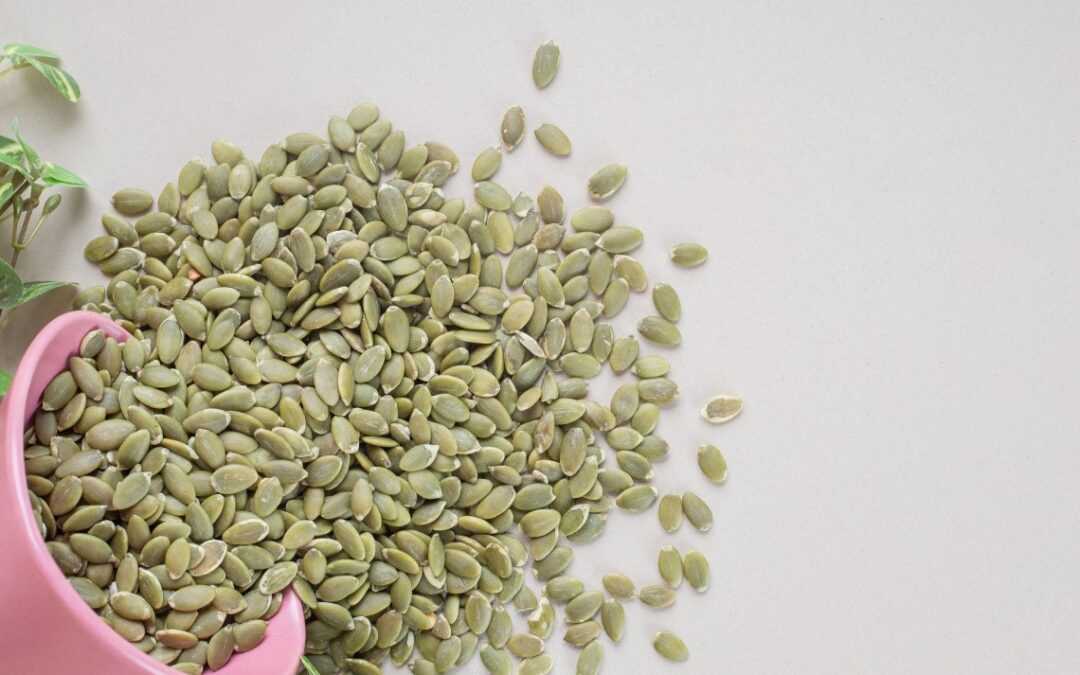Pumpkin Seeds
(Botanical Name: Cucurbita maxima)
Introduction
Pumpkin seeds are also known as “pepita” . A Mexican Spanish term. Pumpkin seeds can be enjoyed both with and without their shell. Pumpkin seeds without their shell are often called pepitas and can be identified by their smaller, green appearance. Eating only a small amount of them can provide you with a substantial quantity of healthy fats, magnesium and zinc. They also contain a lot of antioxidants and a decent amount of polyunsaturated fatty acids, magnesium, potassium, vitamin B2 (riboflavin) and folate.
Nutritional Content:
One ounce (28 grams) of shell-free pumpkin seeds contain:
- Calories: 151
- Fiber: 1.7 grams
- Carbs: 5 grams
- Protein: 7 grams
- Fat: 13 grams (6 of which are omega-6s)
- Vitamin K: 18% of the RDI
- Phosphorus: 33% of the RDI
- Manganese: 42% of the RDI
- Magnesium: 37% of the RDI
- Iron: 23% of the RDI
- Zinc: 14% of the RDI
- Copper: 19% of the RDI
Benefits:
- Anti-inflammatory due to its anti-oxidants content
- Helpful in cancer particularly stomach, breast, lung, prostate and colon cancer
- Helpful in Benign Prostatic Hyperplasia (BPH)
- Controlling high blood pressure
- Reducing heart disease risk
- Forming and maintaining healthy bones due to its magnesium content
- Regulating blood sugar levels
- Helpful as a sperm booster
- Helpful in weight loss
- Aid in sleeping due to its tryptophan content
- high levels of magnesium in the extract may reduce the incidences and intensity of migraines
Risks:
People should take cautions while taking pumpkin seeds if they:
- take any personalized vitamins or supplements (Note that pumpkin seeds contain phytic acid, which may inhibit the absorption of other vitamins and minerals)
- take sleeping pills
- take anti-depressants
- take Diuretic Drugs
How to Eat?
- Take 5 gram of raw pumpkin seeds once or twice daily depending upon underlying disease
Pumpkin seeds can be consumed in a number of ways, such as:
- raw or in a homemade trail mix
- sprinkled onto salads or waffles
- baked into muffins or on top of breads
- mixed into yogurt and oatmeal
- blended into smoothies
- mixed into warm noodle dishes or stir-fries
- on top of avocado toast
- blended in a food processor with nutritional yeast, bread crumbs, and seasonings to make vegan “Parmesan” cheese
If you regularly eat pumpkin seeds, consider roasting them or soaking and sprouting them to reduce their phytic acid content
Precautions:
Pumpkin seeds are high in fiber, so eating large amounts may cause gas or bloating. Eating large amounts of pumpkin seeds at once may cause constipation. Pumpkin seeds feature a high fat content, so they are prone to rancidity. People should keep them in a cool, dark, and dry place to improve shelf life. Excessive use of these may cause unwanted weight gain
Frequently Asked Questions!
Q1: Should pumpkin seeds be soaked?
Ans. Pumpkin seeds have a thin membrane that contains enzymes that are hard to digest. Hence, soak them for 12-24 hours before eating.
Q2: Can you eat pumpkin seeds on an empty stomach?
Ans. Yes. Consuming pumpkin seeds on an empty stomach may help detoxify the body.
Q3: Which is better: raw or roasted pumpkin seeds?
Ans. Raw pumpkin seeds offer more nutrition value than roasted ones.
Q4: How Do Pumpkin Seeds Benefit Your Health?
Ans. Pumpkin seeds have antioxidant, anti-inflammatory, antimicrobial, anti-arthritic, and anti-diabetic properties. Extensive research also linked the consumption of these seeds to lower the risk of cancer and UTIs.
References
- American Heart Association: “Pumpkin seeds pack a healthy punch.”
- Biomedical Journal of Scientific and Technical Research: “Nutritional and Therapeutic Importance of the Pumpkin Seeds.”
- Harvard University: “Fiber.”
- Harvard Medical School: “Magnesium.”
- Indonesian Journal of Cancer Chemoprevention: “A Review: The Emerging Nutraceutical Potential of Pumpkin Seeds.”
- Journal of Medicinal Food: “Antihypertensive and cardioprotective effects of pumpkin seed oil.”
- National Institutes of Health: “Zinc.”
- Nutrients: “The Effects of Magnesium Supplementation on Subjective Anxiety and Stress—A Systematic Review.”
- Nutrition Reviews: “Dietary fiber and its associations with depression and inflammation.”
- USDA Food Central: “Pumpkin Seeds.”
Want to Know More?
Contact Our Expert Healthcare Professionals for further Understanding of your Disease!

